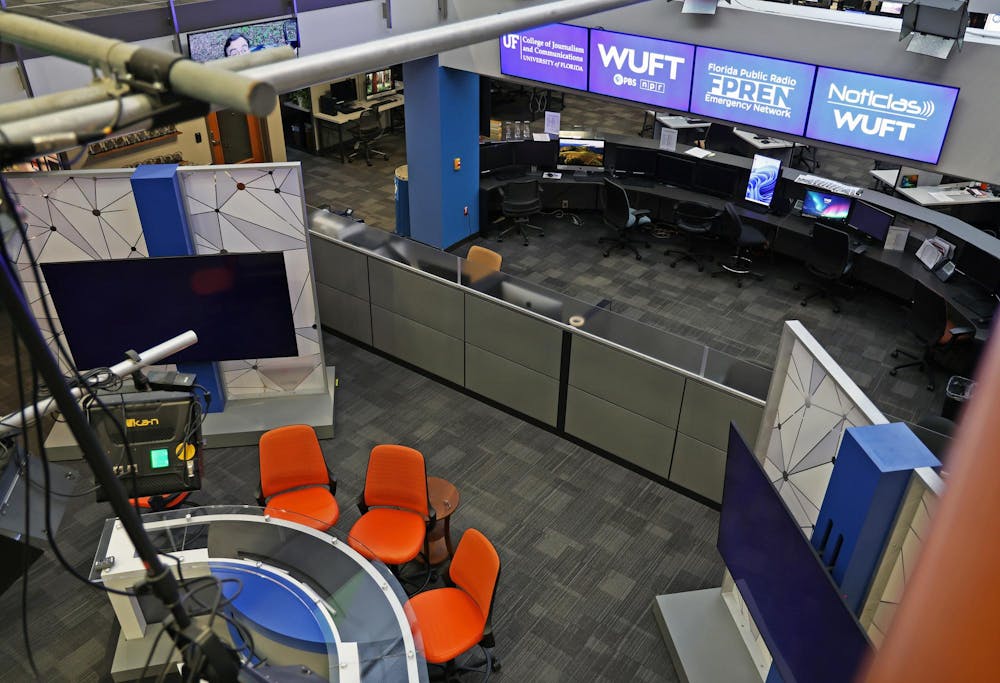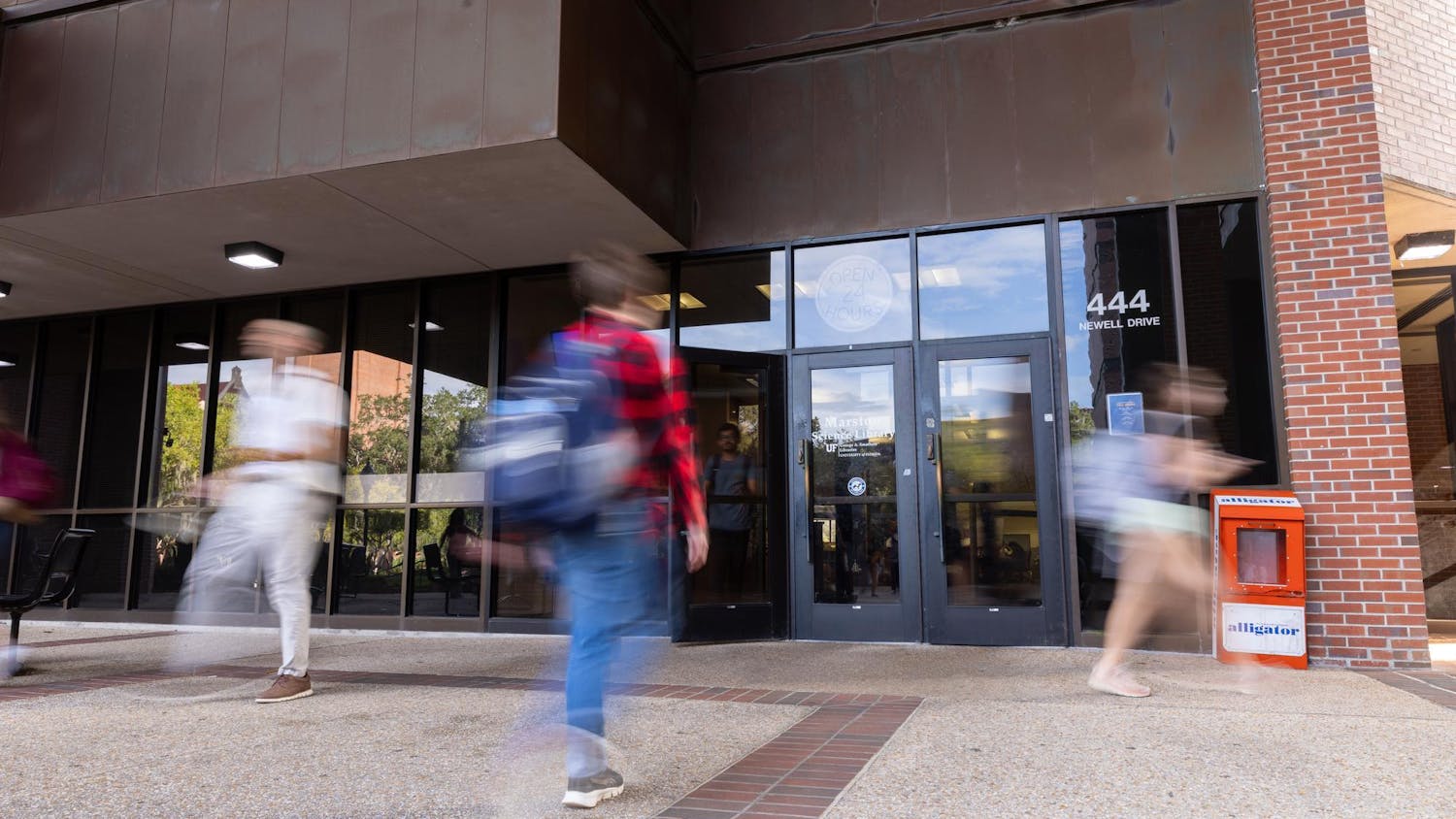Read more from The Alligator's "Ripple Effects" special section here.
Following the federal slashing of funds toward public media, WUFT — Gainesville’s local NPR and PBS station, housed at UF — is looking for ways to fill its funding gap.
In July, the Trump administration cut $1.1 billion from the Corporation for Public Broadcasting, which funds nationwide public TV and radio stations.
Immediately following the announcement, Hub Brown, dean of UF’s College of Journalism and Communications, said in an email to the college the national cuts would rescind $1.2 million annually from WUFT’s TV and radio stations.
WUFT, UF’s student-driven local news outlet, is primarily funded by donors, corporate sponsors, UF, the Corporation of Public Broadcasting and the state. Since the cuts, Brown said, the college has relied on a previously built reserve to sustain it through the 2026 fiscal year until a long-term solution is found.
“I'm optimistic that we're going to be able to get through this,” he said.
Brown said WUFT is “certainly not” relying on state assistance to resolve the issue. Gov. Ron DeSantis’ line-item veto prevents the college from relying on the state to fill in national funding gaps, he said.
DeSantis denied nearly $6 million to Florida’s public broadcasting outlets for the 2025-2026 fiscal year. The Florida Public Radio Emergency Network, a public safety initiative housed at WUFT, was spared from the funding vetoes.
The governor cut about $370,000 from each public TV station and $100,000 from each public radio station. All together, WUFT also lost around $470,000 because of the loss in state support, Brown confirmed in a July email.
Instead of the state, he said, WUFT is working with UF central administration to replace funding. In particular, they hope to sustain staff who directly affect WUFT’s “educational mission.”
“If you're in broadcast journalism, it's quite likely one of your faculty members was somebody who, is somebody who, was supported by some of that funding that we got,” he said.
UF employed 26 full-time WUFT public radio and TV employees, in addition to 13 people whose salaries came only partly from WUFT, last academic year, according to school-provided data. Altogether, their salaries totaled about $2.6 million.
UF’s leadership understands the value of WUFT, Brown added. The short-term goal is to ensure students do not feel the impact of the cuts. The long-term solution, though, is “still up for discussion.”
Randy Wright, the executive director of the division of media properties, said the station’s operational funds were reduced by around 20%.
No full-time positions have been cut, he said, but some part-time staff hours have been reduced. The station is focusing on increasing revenue by selling underwriting, which allows private businesses to provide support via donations.
Brown strongly advocated on behalf of the college to UF’s administration, and UF recognized WUFT’s uniqueness in providing “extraordinary experiences” to students, Wright said.
“WUFT and our staff play a significant role in what makes our college one of the national leaders in mass communication education,” Wright said.
Alicia Coleman, managing editor and associate chair of the Innovation News Center, said though the station lost over a million dollars, it’s “been pretty OK.”
Coleman has not seen any issues resulting from the cuts, she said, but staff has been asked to find ways to cut back — for example, by reducing some station-funded staff travel. She added even when the cuts happened, she was not worried.
“The work that we do kind of stands alone and is needed, and so I'm very optimistic that everything will kind of work out,” she said.
But, to some, the issue is deeper, and indicative of government censorship. Derek Bambauer, a UF law professor, said the administration’s financial decisions demonstrate an attempt to influence news coverage.
Bambauer acknowledged no entity is guaranteed government funding, and it “makes sense” in a time of serious budget constraints that various cuts would be made. However, he added the public broadcasting changes appear to be because of perceived political bias, saying the policy is hard to justify “as a matter of finances.”
“The idea that we’re going to save significant money by eliminating money for CPB or NPR is literally laughable,” he said.
The internet censorship expert added the push against the media is not a unique moment in American history. It’s “hardly a secret” cracking down on the Corporation for Public Broadcasting has been on the Republican agenda for years, he said.
According to PBS, every Republican president, with the exception of Gerald Ford, has attempted to cut public media spending. President George W. Bush, the last Republican president before Trump, included cuts of over $53 million dollars from CPB for 2007 and $50 million for 2008.
The distinction this time is media companies must simultaneously handle financial transitions and government pressures to sway coverage.
Bambauer said financing solutions will have to be philanthropic, and outlets will have to experiment with different revenue models. In the long-term, he said, companies will have to leverage the internet, using platforms like TikTok to produce high-quality content.
“Ultimately, I am confident that people are in fact willing to pay for information that’s valuable to them,” he said.
Kevin Goldberg, vice president of the Freedom Forum, said not only news stations will feel the effects, but also members of the community. He added local coverage will likely be put on the back burner, creating news deserts, and citizen awareness will be diminished.
While it is difficult to legally correlate Congress’ budget cuts with media censorship, Goldberg said, the resulting lack of local news will prevent citizens from exercising their First Amendment rights.
“Without them showing up for us, representing us, asking for us and publishing to us, we can’t participate at all in any meaningful way,” he said.
Local journalism is necessary for government oversight, he added, but these cuts make journalists’ watchdog role more difficult. Though freelancers and individual media outlets may take over, he said there are constraints, and the quality of local governmental coverage and citizen awareness of their communities could diminish.
Goldberg said there is hope that online media can fill the journalism gaps, adding small outlets could ensure local communities will continue to be covered.
“It’s an irreplaceable public service,” he said.
Contact Maria Arruda at marruda@alligator.org. Follow her on X at @mariazalfarruda.

Maria is the Fall 2025 student government reporter for the Alligator. She's a sophomore journalism and political science major at UF and hopes to work as a political correspondent one day! Maria loves to read, hang out with her friends, see her family and go to the gym in her spare time.






